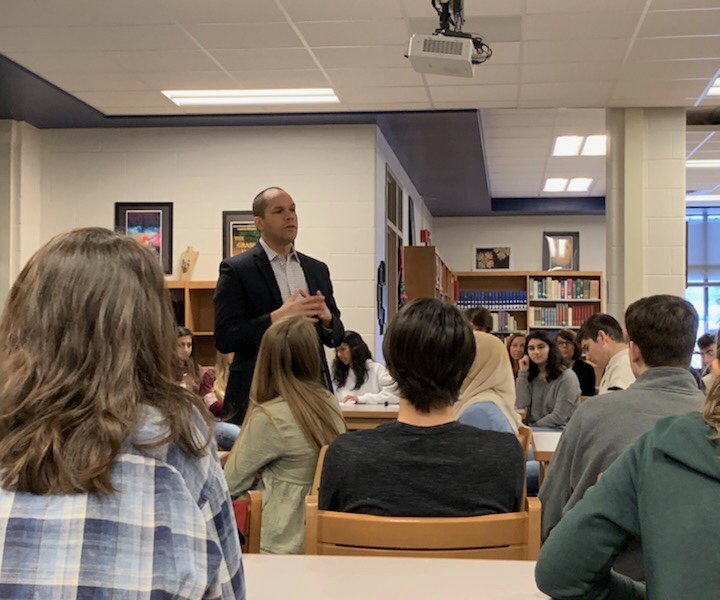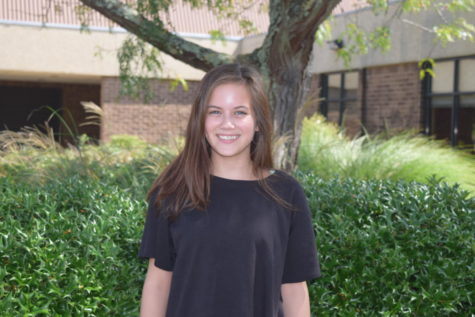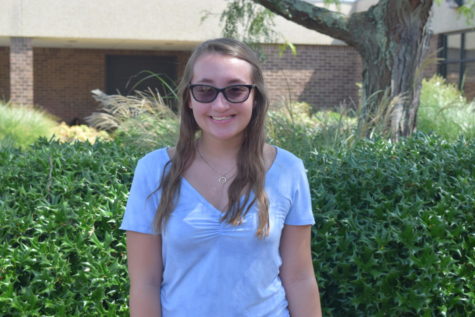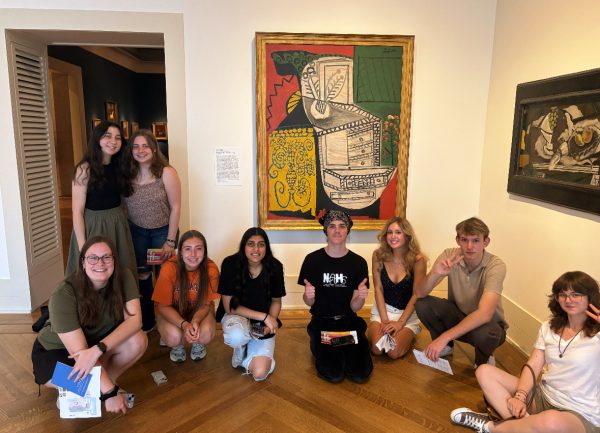Siddiqi Talks Textbooks With Midlo Students
Dr. Siddiqi Meets With Students to Discuss Online vs. Physical Textbooks
On Friday, February 1, 2019, students gathered in the library during Midlo Morning to discuss whether the CCPS School Board should continue to purchase physical textbooks in the classroom or completely switch over to online textbooks. School Board Vice Chairman Dr. Javaid Siddiqi visited Midlothian to discuss the hot topic of whether students should abandon their heavy textbooks and use online resources instead.
Midlo Social Studies teachers, Mr. James Wilson and Mrs. Cammeron Bennett, organized the event so that students could take part in this important discussion. Dr. Siddiqi started the talk by mentioning, “[Current] textbooks have become very outdated, such as referring to Obama as a senator running for office.” Many argue that textbooks are the traditional way of learning and taking away the outdated pages of facts and replacing them with a modern, convenient online resource might short-change the younger generation. Dr. Siddiqi explained that physical textbooks can cost up to $300,000 to $400,000 per school year. Mrs. Regina Warriner attended the meeting and enjoyed the positive give and take of the physical versus online textbooks conversation. “I am thrilled to see students taking an active role in advocating for student choice regarding the resources that impact their educational experience,” shares Warriner.
More and more teachers rely on Chromebooks or tablets to assign their students work every year, while parents at home simultaneously help their children adapt to operating changing technology. Today, available technology exists almost everywhere, and some argue that it is better for younger students to get used to the use of online textbooks at school, so they can continue to use them in their everyday lives. Dr. Siddiqi also mentioned that online textbooks offer advantages for many things besides just reading; teachers can insert programs that allow interactions between the textbook and the student through small assignments given after each page.
Online textbooks “are linked to Internet and not all students have access to that at home or on the go,” says senior Elizabeth Six. However, studies show that younger generations of students prefer not to carry around textbooks with them wherever they go. Other concerns with the online versions of textbooks are the damage they can do to students eyes when they stare at a computer screen for too long. Some argue that those who stare at a screen for too long are more likely to experience health issues later in life, such as permanent eye damage. Despite these concerns, based on a Google survey, over 60% of students who find using an online textbook easier because of its interacting capabilities, such as practice quizzes and finding terms easier. Interacting and engaging with a textbook is very important, and with online textbooks, younger students can find information more easily.
Some boundaries exist with online textbooks as well, such as students who have a language barrier, such as junior Natalie Solares, who explains,“English is my second language, and I had an easier time following words I didn’t know with my finger on a physical textbook.” Also, technology provides temptations for students not to do their work if they are on a computer or tablet due to the numerous distractions available at the click of a button. Not everyone prefers the physical copy, though, as student Isaiah Morton says, “Schools should have physical textbooks available to students who want [them], but I considered my homework and other studies in my AP class to be less of a struggle when I could look up a certain page and be able to navigate faster online.”
Dr. Siddiqi describes the topic of physical versus online textbooks as a difficult conversation to carry on with everyone because many consider being “current not as important as being able to interact with their textbook.” Junior Trey Powers prefers the online textbook, stating, “My AP Psych textbook has been great while using the online textbook because it is easy to use and go to a specific page number that I need to find.” Student Morgan Sensabaugh offers an opposing viewpoint, sharing, “Most colleges even today use physical textbooks and expect you to be able to read a few chapters, write notes on the page, and cite things with the actual copy. Not being able to do that makes students unprepared for college life.”
Dr. Siddiqi facilitated this revealing discussion with much patience as he listened to the students’ opinions and requested names of the students who gave their voice to a sometimes controversial cause. Both students and teachers attended the meeting and took a lot away from it. “It was very informative, and it was important in letting us have a voice in the matter,” says Spencer Willett. Thank you to Dr. Javaid Siddiqi for coming to Midlo and talking with our students about a decision that will greatly impact education in the future.







